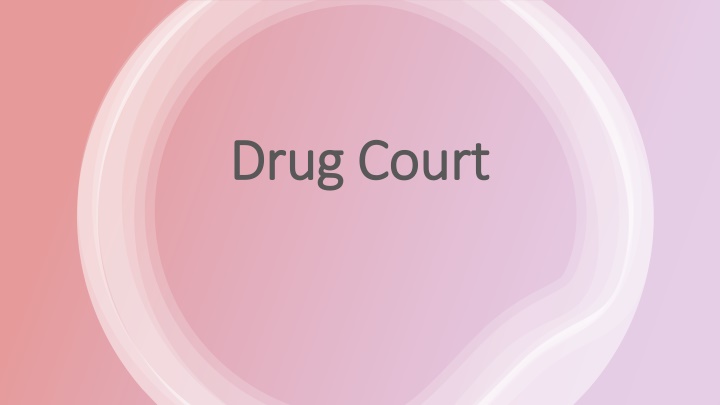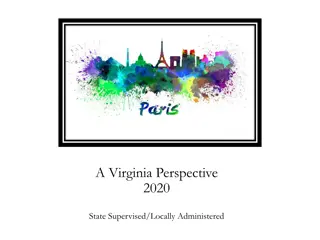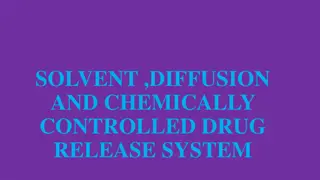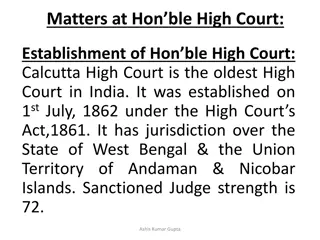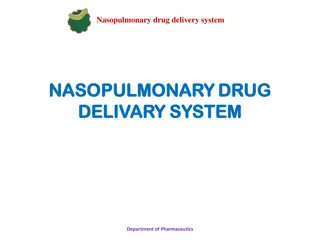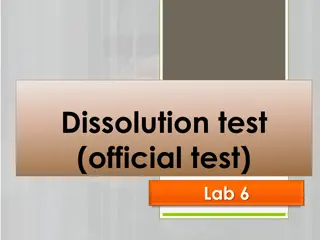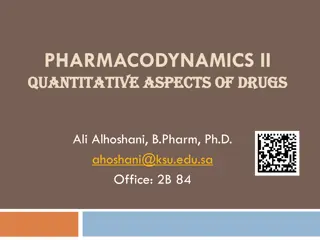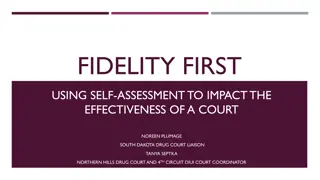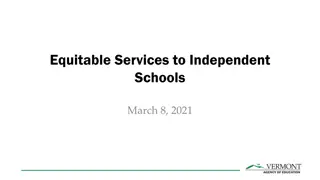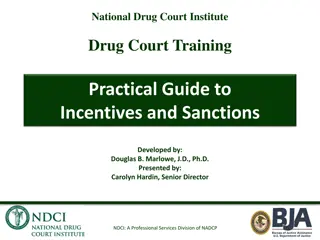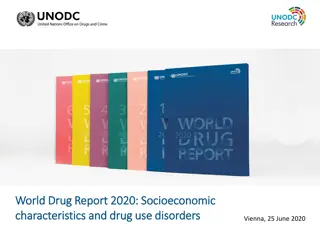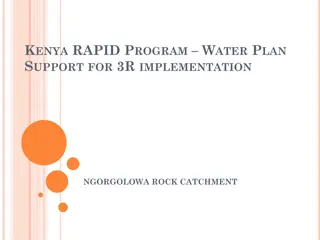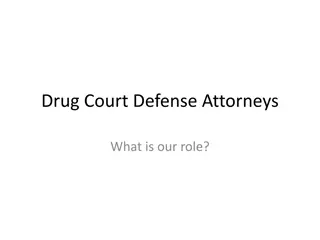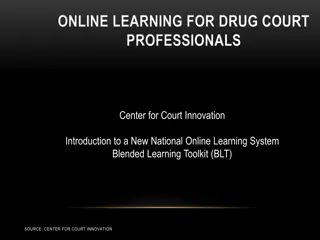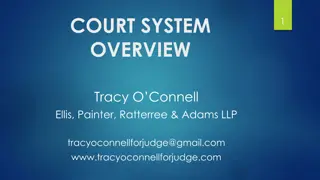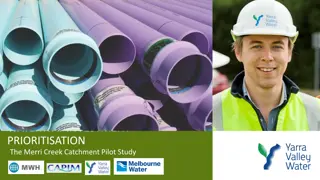Drug Court Program Eligibility Criteria and Catchment Areas
Learn about the eligibility criteria for the Drug Court Program, including requirements such as specific offences, drug dependency, and residence within catchment areas. Explore the different catchment areas, including Sydney, Dubbo, and Hunter, where the program is available. See examples of individuals' eligibility based on their residence and offences.
Download Presentation

Please find below an Image/Link to download the presentation.
The content on the website is provided AS IS for your information and personal use only. It may not be sold, licensed, or shared on other websites without obtaining consent from the author.If you encounter any issues during the download, it is possible that the publisher has removed the file from their server.
You are allowed to download the files provided on this website for personal or commercial use, subject to the condition that they are used lawfully. All files are the property of their respective owners.
The content on the website is provided AS IS for your information and personal use only. It may not be sold, licensed, or shared on other websites without obtaining consent from the author.
E N D
Presentation Transcript
Drug Court Drug Court
Must be charged with eligible offences Highly likely to serve a fulltime sentence of imprisonment Have entered a plea of guilty or be willing to enter a plea of guilty Be drug dependant (determination made by Health representative) Usual place of residence is within the Drug Court catchment area A person is not eligible if: They are charged with an offence punishable under Division 2 of Part 2 of the Drug Misuse and Trafficking Act 1985, unless it is able to be dealt with summarily; OR An offence involving violent or sexual conduct Who might be eligible for Drug Court?
Drug Court Catchment Areas Drug Court Catchment Areas Sydney Drug Court Bayside City of Randwick City of Sydney Georges River Waverley Woollahra Inner West Canada Bay Burwood Hunters Hill Strathfield Lane Cove Mosman North Sydney Ryde Willoughby Dubbo Drug Court Dubbo Wellington Hunter Drug Court City of Cessnock City of Lake Macquarie City of Maitland City of Newcastle Port Stephens Parramatta Drug Court Canterbury-Bankstown City of Blacktown City of Campbelltown City of Fairfield City of Hawksbury City of Liverpool City of Parramatta City of Penrith Cumberland The Hills Shire
DANIEL Daniel has eligible offences for a Drug Court Program. Daniel has been living in Sutherland (out of area) since 2022 but says he can live with Dad at Redfern (in area) for the purpose of a Drug Court Program. Do you refer Daniel?
Usual place of residence Where do you sleep most nights? Where are your belongings? Where does your mail go? What is your address with Centrelink? Where is your GP? Where do you get you injection or methadone? A person does not need to have a place to reside to be referred to the Drug Court
SAMANTHA Samantha was bailed to an address in Wollongong (out of area) for three months before going into custody, she was reporting to Wollongong Police Station 3 times per week. She instructs you that she was never living in Wollongong in accordance with her bail and was living with her partner in Marrickville. Would you refer Samantha?
How does a client get onto the program?
Its 3pm Lincoln is in custody and his private lawyer has not shown up today, the Magistrate has asked you to speak with him. Lincoln is 28, he is charged with 5 sequences of Recklessly deal with proceeds of crime. He was previously charged with SI matters that have been withdrawn and matters are remaining in the Local Court. The total amount of proceeds of crime is $1.5 million. He tells you he has an addiction to cocaine, he has never used ice or heroin. He has a university commerce degree and was working in finance. Would you refer Lincoln? Lincoln
YES Legal Aid is available to everyone referred to Drug Court the means test does not apply Drug dependency does not only limit itself to substances such as ice and heroin. ADDICTION DOES NOT DISCRIMINATE Large frauds may be an issue as the community expectation may be that a person should be sentenced at law However Lincoln s matters are remaining in the Local Court jurisdiction which gives rise to 5 years maximum. If the matters are in the District Court and the person is looking at over 6 years the person is likely to be found inappropriate
Brayden Brayden is a 53 year old Aboriginal Man. Brayden is charged with a police pursuit, drive whilst disqualified, possess prohibited drug 0.5 grams of ice and a bunch of fine only driving offences. Brayden is on parole for drive whilst disqualified. From 2010 2015 its hard to find anytime he wasn t in custody for domestic violence related charges including AOABH and continually contravening his AVO. In 2018 he was charged with Robbery and was sentenced to 3 years with NPP 18 months Would you refer Brayden?
YES Brayden would have some issues regarding appropriateness due to having violent matters on his record as well as the police pursuit The court can impose conditions that mitigate these risks such as no driving and no violence Brayden may not come on however it is worth a referral R v Tucker [2001] NSW DRGC 3 para 11 addresses the court having discretion over a person antecedents
Joshua is 19 years old, his criminal history is 40 pages beginning in the Children s Court and he is currently on an ICO for larceny. The ICO has been revoked. He has 6 different H numbers which include pay wave type frauds, total being $3k and one deemed supply charge 5 grams of ice You also notice an outstanding charge of Common Assault (DV) and Contravention of AVO listed for hearing at Parramatta in 3 months time. Do you refer Joshua? Joshua
YES Outstanding matters that are likely to result in a fulltime sentence will need to be vacated and brought to the Drug Court. If a person has outstanding matters they may be unavailable at the ballot stage. It is always helpful to find out if the outstanding matters are something they are willing to bring across to Drug Court you do not need to vacate them to refer the client The court can deal with current matters of violence if they are low level and not the main charge. The court can adj under s11 or impose a short fixed term using pre sentence custody. R v Tewake [2005] NSW DRGC 2 Revocation of an ICO or parole is not a barrier to a Drug Court Program. Drug Court has a memorandum of understanding with Corrective Services, a persons revocation will be rescinded if accepted onto the Drug Court and their supervision will be transferred to the Drug Court.
Max is charged with 2 sequences of ongoing supply of a prohibited drug (methamphetamines) and one possess prohibited drug (cannabis). Max has 2 previous convictions for supply in 2010 where he received s12 good behaviour bonds for a period of 2 years. In a conference with Max he says he is motivated to do the Drug Court Program and he was supplying to support his own habit. Do you refer Max? Max
YES The supply can be dealt with summarily so is an eligible offence. However, the Crown may raise issues with his appropriateness due to the current charges and his history
TORI Tori is on bail for 3 sequences of Break Enter and Steal. Tori uses ice on a daily basis and she was under the influence at the time of offending. You think Tori might get an ICO if she gets a good draw. She instructs she want to do Drug Court. Do you refer Tori?
If Tori is on bail you should advise her that if she is accepted on to the program she should be prepared to go into custody for up to 6 weeks You should advise Tori that by going to the Drug Court she must waive her right to a District Court Appeal. You could always try your luck in the Local Court and Tori could be referred on a District Court Appeal Maybe
Who not to refer Strictly indictable drug supply charges Violent offences with no eligible referred offences or where the eligible referred offence would not attract a fulltime gaol sentence Charges where fulltime custody is not likely Current sexual offences Prior participant who has not had three years since their final sentence date or NPP or conclusion of ICO imposed by Drug Court (which ever is later in time) Previous applicants who were found not eligible or appropriate less than 2 years ago Previous referrals to the ballot who were not successful in the ballot and have no additional H numbers Commonwealth offences exception where commonwealth sequences can be sentenced by Local Court and other sequences can be sent to Drug Court
Isn't Drug Court a get out of gaol free card?
Phase 1 Phase 2 Phase 3 Minimum 3 months Minimum 5 months Minimum 4 months Attend court once per week Curfew 7pm 7am for the four weeks Weekly home visits from community corrections officer Weekly counselling appointments Drug tests three times per week Not able to do any paid employment No alcohol Attend court once a month Monthly counselling appointments Monthly check in with community corrections Need to be working minimum 3 days per week or engaging in positive activity 3 days per week Alcohol must be below BAC 0.05 Drug tests twice a week Attend court fortnightly Start looking for work or positive activity such as tafe Fortnightly home visits with community corrections Fortnightly counselling appointments Alcohol must be below BAC 0.05 Drug tests twice a week
Be drug free for 3 months Employed or engaged in positive activity What does it take to Graduate? Completed all three phases of the program and be on program minimum of 12 months Must not have committed any crime in the last 6 months that if taken to court is punishable by imprisonment
Dubbo: 80 What is the capacity of the Drug Court? Hunter: 80 Parramatta: 160 Sydney: 160
Dubbo Hunter Total: 24 Total: 69 Current numbers for each location *as at Monday 24 June 2024 ATSI: 18 ATSI: 26 Parramatta Sydney Total: 164 Total: 64 ATSI: 74 ATSI: 18
Compulsory Drug Treatment Correctional Centre (CDTCC) A person is eligible for CDTCC if the person has been sentenced to a term of fulltime imprisonment and at the time that the sentence was imposed there is at least 18 months left on their NPP , and The total time left on sentence is no more than 6 years The person is drug dependant and the offence was related to the person s long-term drug dependency A person is not an eligible convicted offender if the offence for which the person has been convicted involved the use of a firearm, or the person has been convicted at any time of any of the following murder, attempted murder or manslaughter, sexual assault of an adult or child or a sexual offence involving a child, any offence involving the violent use of a firearm, an offence involving a commercial quantity or large commercial quantity of a prohibited plant or prohibited drug,
